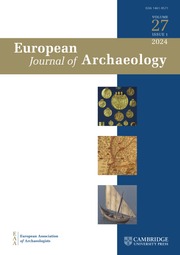Article contents
The World after Thor Heyerdahl: Challenges to Archaeology in the Twenty-First Century
Published online by Cambridge University Press: 25 January 2017
Abstract
Archaeology has been traditionally looked at as a science which reconstructs human history and evolution through the study of material objects. This contribution revisits archaeology as a discipline which revives national pasts, and thus partakes in generating myths of roots and identity. In the world ‘after Thor Heyerdahl' – plunged in environmental crisis and haunted by economic collapse of many communities – the hunger for these myths is bound to intensify. I argue that today, especially, there is a need for archaeology in ‘Thor Heyerdahls' ’ sense: one which would illuminate the unity of mankind and emphasize the imperative of reclaiming nature as human habitat.
L'archéologie a traditionnellement été considérée comme une science reconstituant l'histoire et l'évolution de l'homme par l'étude des objets matériels. Cette contribution revoit l'archéologie comme une discipline qui ravive les passés nationaux, et participe ainsi dans la production de mythes sur les racines et l'identité. Dans le monde d' ‘après Thor Heyerdahl' – plongé dans une crise environnementale et hanté par le collapse économique de nombreuses communautés – le désir ardent pour ces mythes va encore s'intensifier. Je soutiens qu'aujourd'hui, de plus en plus, il y a un besoin pour une archéologie dans le sens de Thor Heyerdahl: une archéologie qui éclairerait l'unité de l'humanité et insisterait sur l'obligation de réclamer la nature comme habitat humain. Translation by Isabelle Gerges.
Zusammenfassung
Archäologie wird gemeinhin als Wissenschaft angesehen, die menschliche Geschichte und Evolution durch die Untersuchung der materiellen Kultur rekonstruiert. Dieser Beitrag kommt auf eine Archäologie zurück, die als Disziplin nationale Vergangenheiten wieder erstehen lässt und somit daran teilhat, Mythen von Wurzeln und Identität zu generieren. In einer – in eine Umweltkrise gestürzten und vom ökonomischen Kollaps zahlreicher Gemeinschaften gejagten – Welt ‘nach Thor Heyerdahl' muss der Hunger nach diesen Mythen steigen. Die Verf. führt aus, dass besonders heute ein Bedürfnis nach Archäologie im Sinne von Thor Heyerdahl besteht: eine Archäologie, die die Einheit der Menschheit erhellt und das Gebot der Wiedererlangung der Natur als menschliches Habitat betont. Translation by Heiner Schwarzberg.
Keywords
- Type
- Articles
- Information
- Copyright
- Copyright © European Association of Archaeologists 2012
References
- 3
- Cited by




